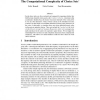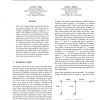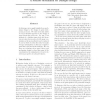107
click to vote
TARK
2007
Springer
15 years 8 months ago
2007
Springer
Social choice rules are often evaluated and compared by inquiring whether they fulfill certain desirable criteria such as the Condorcet criterion, which states that an alternativ...
TARK
2007
Springer
15 years 8 months ago
2007
Springer
This paper generalizes the notion of common p-beliefs to situations of ambiguity or Knightian uncertainty. When players have multiple prior beliefs,we show that Aumann’s no-agre...
TARK
2007
Springer
15 years 8 months ago
2007
Springer
Williamson (2000a) has argued that positive introspection is incompatible with inexact knowledge. His argument relies on a margin-for-error requirement for inexact knowledge based...
127
click to vote
TARK
2007
Springer
15 years 8 months ago
2007
Springer
Most work in game theory assumes that players are perfect reasoners and have common knowledge of all significant aspects of the game. In earlier work [Halpern and Rˆego 2006], w...
TARK
2007
Springer
15 years 8 months ago
2007
Springer
113
click to vote
TARK
2007
Springer
15 years 8 months ago
2007
Springer
In this paper is we apply insights from mechanism design to the design of agent interaction protocols. We show how this allows us a more flexible approach to the design of agent ...
108
click to vote
TARK
2007
Springer
15 years 8 months ago
2007
Springer
The problem of the aggregation of consistent individual judgments on logically interconnected propositions into a collective judgment on the same propositions has recently drawn m...
121
click to vote
TARK
2007
Springer
15 years 8 months ago
2007
Springer
In the most popular logics combining knowledge and awareness, it is not possible to express statements about knowledge of unawareness such as “Ann knows that Bill is aware of so...
107
click to vote
TARK
2007
Springer
15 years 8 months ago
2007
Springer
This paper considers the robustness of equilibria to a small amount of incomplete information, where players are allowed to have heterogenous priors. An equilibrium of a complete ...
143
click to vote
TARK
2007
Springer
15 years 8 months ago
2007
Springer
We investigate the discrete (finite) case of the Popper-Renyi theory of conditional probability, introducing discrete conditional probabilistic models for (multi-agent) knowledge...



